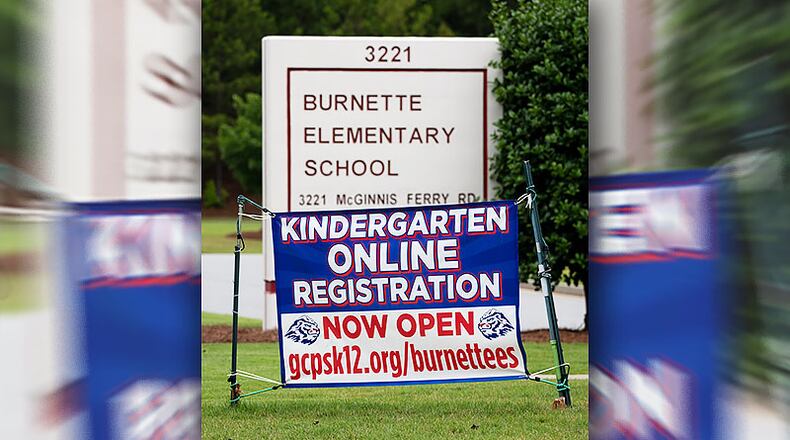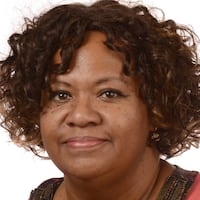As metro Atlanta schools prepare for fall enrollment, parents must decide this month whether to enroll their children in online classes or in-person courses at a school building.
Orlando Mitchell, who has a child in the Buford City School District, said he’s planning to take the option for at-home learning.
“We’re not sending our child back,” he said. “It’s too soon, and it’s not worth the risk.”
Area schools closed buildings in March and shifted to online learning to help curb the coronavirus. Now, cases of the coronavirus are soaring again just as school districts are trying to finalize plans for fall.
School districts are encouraging parents to register as early as possible, even if they aren’t sure about their plans. Decisions parents make could weigh heavily on a school district’s bottom line. Metro Atlanta schools rely on consistent student enrollment to keep their budgeting on track.
For example, Gwinnett County looks at an increase of about 600 students every year. With the per pupil funding allotment around $10,000 per student, a significant shortfall can affect staffing, services and the overall operation.
Some parents are eager for their children to return to in-school learning.
Kelly Willyard and Steven Gasper were so adamant that Gwinnett offer in-person classes that they attended the June board instead of giving their comments via telephone as others did. The couple has 10-year-old twins, and he often travels out of town for his job.
“We work every day and we don’t have the skills or the knowledge to be teachers,” said Willyard. “The distance learning just doesn’t work. It broke my heart when a parent told me they had to park outside a Wendy’s for the Wi-Fi so their child could do their homework.”
RELATED STORY: Gwinnett rolls out plan for in-person classes this fall
RELATED STORY: Buford to supply laptops to all students
The Atlanta Journal Constitution asked the top 10 school districts by enrollment for data looking at enrollment projections, current enrollment and enrollment this time a year ago. Of the five districts that responded, DeKalb County is anticipating an increase of 257 kindergartners from the previous year.
“This is largely due to increased birth rates in DeKalb County five to six years ago along with some contribution from continued housing development over the last few years,” said Hans Williams, Director of Planning and ESPLOST Programming at DCSD.
Kindergarten forecasts are inherently the most variant due to having much less data to work with, Williams said.
“This forecast is from pre-Covid 19, and there is a high likelihood that the population movement patterns and development patterns that led to this forecast have shifted substantially,” he said. “We know that the forecast might have larger than normal error this coming fall, however it is impossible to tell at this time what the forecast error will be.”
Conversely, Fulton County had nearly 2,000 fewer kindergartners and nearly 3,000 fewer students overall registered so far compared to a year ago.
“We are closely monitoring the enrollment of kindergarten students, as we do every year,” said Fulton Chief Academic Officer Cliff Jones. “Compared to last year at this time, 500 fewer students have enrolled. Our Virtual Kindergarten Roundup is planned for July 10th and we will know more after that.”
The school district bases projections on several factors, mainly population forecasts from the Census Bureau. The pandemic is an added twist. Fulton pushed back the start of school a week to give parents more time to decide what to do and get everyone ready for the changes.
“There may be people who decide to home-school, put their children in private school or look for an online school,” said Fulton spokesman Brian Noyes. “We’ll be doing many more check-ins this year to look at our numbers and make sure we’re on track.”
MORE DETAILS: CDC guidelines for in-person learning
Amid the uncertainty surrounding COVID-19, Georgia Cyber Academy is seeing a surge right now in student enrollment. It was founded in 2007 as a statewide public virtual charter school designed to give students an alternative to traditional brick-and-mortar schooling. The school averages about 11,000 students from across the state each year.
Some parents have said they’d consider this alternative to their county schools because it is set up specifically for online learning and provides all materials, including computers and Wi-Fi, if needed.
“We’re getting about 150 new inquiries per day at the moment, an amount that has been trending upward,” said Harper. “The board and administration of the school continue to plan and prepare and will be able to exceed that number by as much as 20% if the demand is there.”
When Gov. Brian Kemp enacted mandatory quarantine in March, the school system allowed mid-year transfers — something it doesn’t normally do.
“We had parents say they weren’t equipped to home school their children and they needed a program that was tailored for at-home instruction,” said Charlie Harper, a member of the Georgia Cyber Academy Board of Directors.
Harper said that like other online instruction, parental involvement is required.
“We look at parents as coaches,” he said. “They assist students, especially the younger ones, with the technology and maybe keep them on track.”
The state Board of Education recently approved spending of up to $1.2 million to hire as many as 100 teachers to augments the Georgia Virtual School, which has 250 teachers. The school, which is state-run, offers supplemental class for middle school and high school students.
Danyell Rivera of Lawrenceville hoped for a plan to allow some learning in-person at school as well as at-home instruction. She has a special needs child that attends a Gwinnett school. But so far, Clayton County Public Schools is the only metro Atlanta district to announce a such a plan. She hasn’t decided what to do.
“Home schooling was a tremendous challenge considering autism children must be on a strict schedule,” she said. “I’m glad that they were able to do digital learning until the end of the year so that they were not having to make up those days or come back to school early.”
About the Author
Keep Reading
The Latest
Featured


